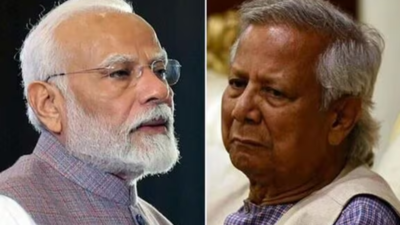NEW DELHI: India has withdrawn a key trans-shipment facility granted to Bangladesh, days after the chief adviser of Bangladesh’s interim government, Muhammad Yunus, described India’s Northeast as a “landlocked” region reliant on Dhaka for access to the ocean — remarks that triggered strong diplomatic backlash.
The decision, announced via a circular issued by the Central Board of Indirect Taxes and Customs on April 8, effectively ends a 2020 arrangement that had allowed Bangladesh to route its export cargo to third countries through Indian Land Customs Stations and onward to ports and airports.
“It has been decided to rescind… circular…dated June 29, 2020, as amended with immediate effect. Cargo already entered into India may be allowed to exit the Indian territory as per the procedure,” the circular mentioned.
The facility had enabled smoother trade for Bangladesh to Bhutan, Nepal, and Myanmar. But Indian exporters, particularly in the apparel sector, had long objected to the arrangement. Apparel Export Promotion Council (AEPC) Chairman Sudhir Sekhri earlier said that 20–30 Bangladeshi trucks arrived daily in Delhi, clogging cargo terminals and spiking freight costs.
“Now we will have more air capacity for our cargo,” said FIEO Director General Ajay Sahai. “In the past, exporters have complained about lesser space due to the trans-shipment facility given to Bangladesh.”
The move comes as global trade tensions rise, with the US recently announcing new tariffs on both India and Bangladesh.
Trade experts say the cancellation will hit Bangladesh’s export logistics hard. “The previous mechanism had offered a streamlined route through India, cutting transit time and cost,” said Ajay Srivastava, founder of Global Trade Research Initiative, as quoted by PTI. “Now, without it, Bangladeshi exporters may face delays, higher costs, and uncertainty.”
The geopolitical undertone became unavoidable after Yunus’ comments in Beijing, where he pitched Bangladesh as “the only guardian of the ocean” for Northeast India and invited China to deepen its economic presence in the region.
“The eastern part of India, the Seven Sisters, are a landlocked region. They have no way to reach out to the ocean. This could be an extension of the Chinese economy,” Yunus had said.
External affairs minister S Jaishankar swiftly countered the narrative, emphasizing India’s strategic maritime and regional links. “We have the longest coastline in the Bay of Bengal… Our North-Eastern region is emerging as a connectivity hub for BIMSTEC,” he said.
With both countries being WTO members, Srivastava cautioned that India’s move may raise concerns over transit rights under WTO rules, especially for other landlocked nations like Nepal and Bhutan.


